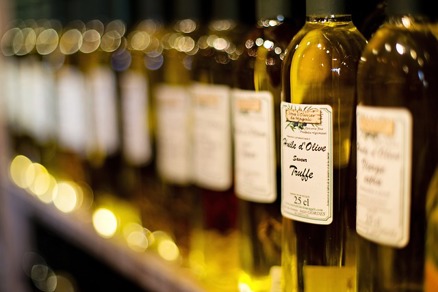Olive Oil Kedushat Shevi'it

How do deal with KS Olive Oil?!
Permissible uses for shemitah oil
The rule of thumb is that any use where its benefit and consumption occur simultaniously is permitted (this is similar to eating). Therefore:
Permissible uses include:
Eating/food prep.
Cooking, frying, baking, a seasoning salad are all permissible. Of course, all of the food it is used with will now have kedushat shevi'it.
Moisterizer.
It is permissible to apply oil on hands, face, other body parts, and hair as moisterizer. Apply the oil directly; do not use cotton balls.
Shabbat candles.
It is also permissible to use the oil to light Shabbat candles or similar lamp light, since the benefit from the oil and its consumption occur at the same time.
Using holy oil for Chanukah candles
There is a dispute whether it is permissible to use this oil holy oil to light Chanukah candles. The reason is that we are not allowed to benefit from the light, so the oil's benefit and consumption do not occur simultaniously. The same holds true for yartzheit candles or the light at the amud.
Rav Shlomo Zalman Auerbach disagrees, since the oil is being used for some benefit (for the mitzvah) and not being wasted.
However, most posekim are stringent (Torah VeHa'aretz Institute follows the stringent majority).
Bottom line: Use a different type of oil for Chanukah candles (even the shamash) and save your holy oil for the permissible uses we saw yesterday.
Forbidden uses for shemitah oil
We are permitted to use shemitah produce for eating (or uses that are similar to eating).
Forbidden uses include:
Avoid pouring shemitah oil into a bonfire to increase the flames, since this is not regular use for most people.
Holy oil should not be used as medication. Shemitah produce is available to use to eat, and not to medicate ("לכם לאכלה - לאכלה ולא לרפואה").
So we should not treat ear infections with warm olive oil.
Likewise, it is forbidden to gargle holy oil to alleviate a sore throat, unless you drink the oil too. It is possible, however, to drink a warm soup with this oil with the intention of alleviating throat pain, since healthy people also drink soup.
Rule of thumb - In general, what most healthy people do is considered normal use and not medicine.
We learn the laws of what constitutes medication (forbidden and prohibited use) from the laws of Shabbat (there, too, it is forbidden to medicate in most cases, unless there is a severe medical problem).
Shemitah oil left in the frying pan
Q: I want to order the shemitah oil, but I'm concerned about what to do with oil left after frying.
Short Answer
Oil follows the rules of any other leftover liquid with kedushat shevi'it: If there is a very small amount in the pan, it is insignificant and therefore the pan can be washed regularly.
For significant amounts: If it is still clean and possible to use it, it is best to use it again. If you don't want to, leave it in an uncovered container overnight. If it is dirty and unfit for another round of frying, it is possible to throw it away.
Expanded answer
The Chazon Ish holds that it is forbidden to throw away oil that is left, since it can be used as lamp light (even though it is not meant to be used for this purpose) (Mishpatei Eretz 23:14; Yalkut Yosef 15:33).
This ruling is in line with his general approach that when produce can technically be used for a certain purpose (like animal fodder), even though it is not generally used in this way; say, even if there are no animals to feed, it still has kedushah.
However, we follow the ruling of Rav Shlomo Zalman Auerbach, that if the produce is not meant to be used for this purpose, there is no need to be stringent.
That is: if most people today do not recycle oil from frying pans to use to light Shabbat candles, after frying the oil no longer has kedushah and can be disposed as usual.
Note that if the oil can be used for another round of frying (it is relatively clean), it still has kedushah and should not be disposed. It is best to use it to fry again, in this case.
What if, for any reason, you don't want to reuse it?
It is possible to put it in a cup or other open container, leave it open all night, and then you can dump it the next day.
Since we are not supposed to consume liquids kept uncovered all night, the oil at this point is effectively spoiled and unfit for human consumption, so it no longer has kedushah.




